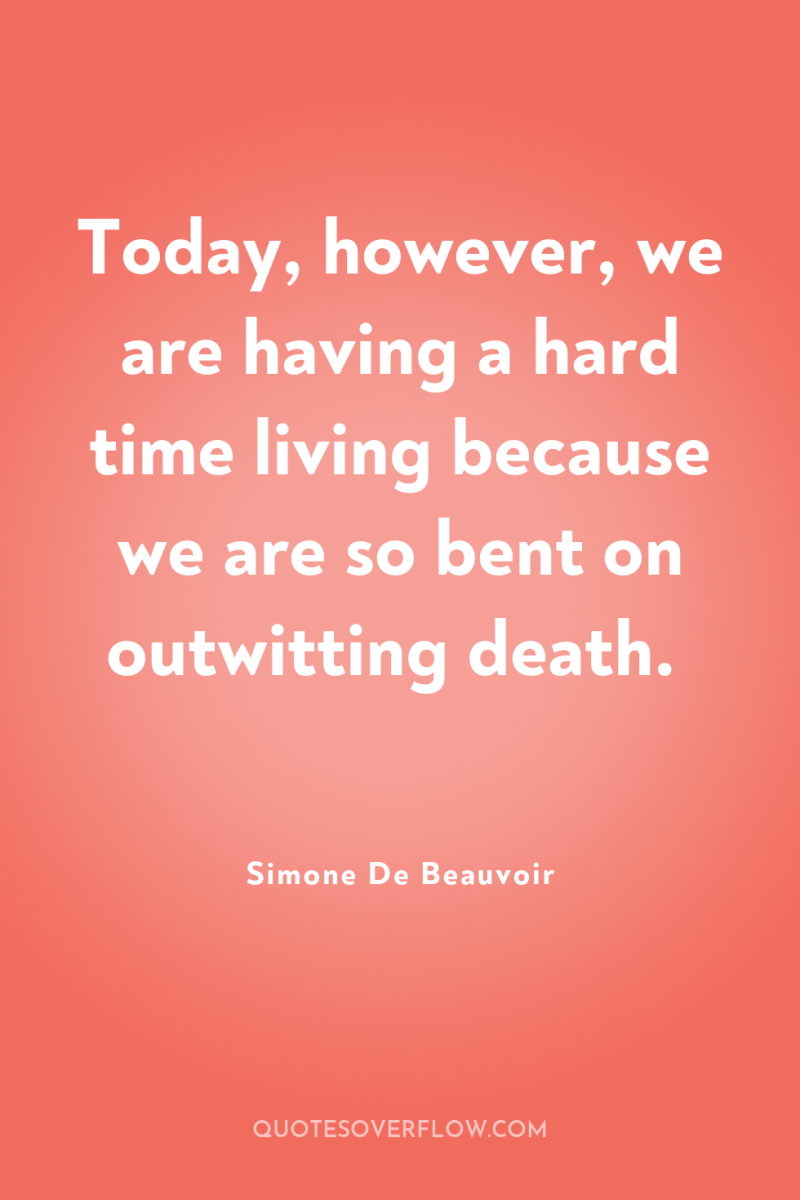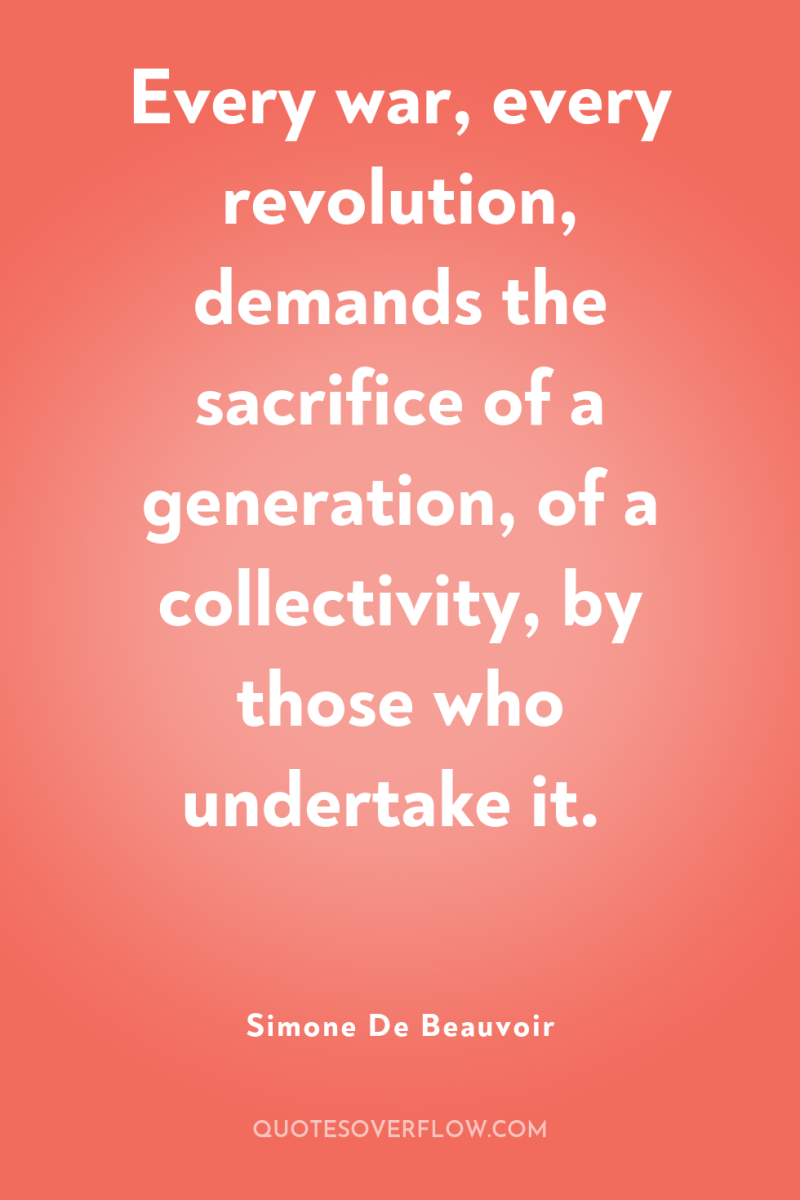1
Regardless of the staggering dimensions of the world about us, the density of our ignorance, the risks of catastrophes to come, and our individual weakness within the immense collectivity, the fact remains that we are absolutely free today if we choose to will our existence in its finiteness, a finiteness which is open on the infinite. And in fact, any man who has known real loves, real revolts, real desires, and real will knows quite well that he has no need of any outside guarantee to be sure of his goals; their certitude comes from his own drive.Simone De Beauvoir

2
Today, however, we are having a hard time living because we are so bent on outwitting death.Simone De Beauvoir

3
Every war, every revolution, demands the sacrifice of a generation, of a collectivity, by those who undertake it.Simone De Beauvoir
4
Therefore the misfortune which comes to man as a result of the fact that he was a child is that his freedom was first concealed from him and that all his life he will be nostalgic for the time when he did not know it's exigencies.Simone De Beauvoir
5
We have to respect freedom only when it is intended for freedom, not when it strays, flees itself, and resigns itself. A freedom which is interested only in denying freedom must be denied. And it is not true that the recognition of the freedom of others limits my own freedom: to be free is not to have the power to do anything you like; it is to be able to surpass the given toward an open future; the existence of others as a freedom defines my situation and is even the condition of my own freedom. I am oppressed if I am thrown into prison, but not if I am kept from throwing my neighbor into prison. .Simone De Beauvoir
6
My contemplation is an excruciation only because it is also a joy.Simone De Beauvoir
7
Ethics is the triumph of freedom over facticity.Simone De Beauvoir
8
The present is a transitory existence which is made in order to be abolished: it retrieves itself only by transcending itself toward the permanence of future being; it is only as an instrument, as a means, it is only by it's efficacy with regard to the coming of the future that the present is validly realized: reduced to itself it is nothing , one may dispose of it as he pleases.Simone De Beauvoir
9
But this element of failure is a very condition of his life; one can never dream of eliminating it without immediately dreaming of death. This does not mean that one should consent to failure, but rather one must consent to struggle against it without respite.Simone De Beauvoir
10
A freedom which is interested only in denying freedom must be denied. And it is not true that the recognition of the freedom of others limits my own freedom: to be free is not to have the power to do anything you like; it is to be able to surpass the given toward an open future; the existence of others as a freedom defines my situation and is even the condition of my own freedom. I am oppressed if I am thrown into prison, but not if I am kept from throwing my neighbor into prison.Simone De Beauvoir
11
To re-establish man at the heart of his destiny is, they claim, to repudiate all ethics. However, far from God's absence authorizing all license, the contrary is the case, because man is abandoned on the earth, because his acts are definitive, absolute engagements. He bears the responsibility for a world which is not the work of a strange power, but of himself, where his defeats are inscribed, & his victories as well.Simone De Beauvoir
12
At the present time there still exist many doctrines which choose to leave in the shadow certain troubling aspects of a too complex situation. But their attempt to lie to us is in vain. Cowardice does not pay. Those reasonable metaphysics, those consoling ethics with which they would like to entice us only accentuate the disorder from which we suffer.Simone De Beauvoir
13
But an action which wants to serve man ought to be careful not to forget him on the way, if it chooses to fulfill itself blindly, it will lose its meaning or will take on an unforeseen meaning; for the goal is not fixed once & for all; it is defined all along the road which leads up to it.Simone De Beauvoir
14
The continuous work of our life, ” says Montaigne, “is to build death.” He quotes the Latin poets: Prima, quae vitam dedit, hora corpsit. And again: Nascentes morimur. Man knows and thinks this tragic ambivalence which the animal and the plant merely undergo. A new paradox is thereby introduced into his destiny. “Rational animal, ” “thinking reed, ” he escapes from his natural condition without, however, freeing himself from it. He is still a part of this world of which he is a consciousness. He asserts himself as a pure internality against which no external power can take hold, and he also experiences himself as a thing crushed by the dark weight of other things. At every moment he can grasp the non-temporal truth of his existence. But between the past which no longer is and the future which is not yet, this moment when he exists is nothing. This privilege, which he alone possesses, of being a sovereign and unique subject amidst a universe of objects, is what he shares with all his fellow-men. In turn an object for others, he is nothing more than an individual in the collectivity on which he depends.Simone De Beauvoir
15
As long as there have been men and they have lived, they have all felt this tragic ambiguity of their condition, but as long as there have been philosophers and they have thought, most of them have tried to mask it.Simone De Beauvoir
16
I should like to be the landscape which I am contemplating, I should like this sky, this quiet water to think themselves within me, that it might be I whom they express in flesh and bone, and I remain at a distance. But it is also by this distance that the sky and the water exist before me. My contemplation is an excruciation only because it is also a joy. I can not appropriate the snow field where i slide. It remains foreign, forbidden, but I take delight in this very effort toward an impossible possession. I experience it as a triumph, not as a defeat.Simone De Beauvoir
17
In the face of an obstacle which it is impossible to overcome, stubbornness is stupid. If I persist in beating my fist against a stone wall, my freedom exhausts itself in this useless gesture without succeeding in giving itself a content. It debases itself in a vain contingency. Yet, there is hardly a sadder virtue than resignation. It transforms into phantoms and contingent reveries projects which had at the beginning been set up as will and freedom. A young man has hoped for a happy or useful or glorious life. If the man he has become looks upon these miscarried attempts of his adolescence with disillusioned indifference, there they are, forever frozen in the dead past. When an effort fails, one declares bitterly that he has lost time and wasted his powers. The failure condemns that whole part of ourselves which we had engaged in the effort. It was to escape this dilemma that the Stoics preached indifference. We could indeed assert our freedom against all constraint if we agreed to renounce the particularity of our projects. If a door refuses to open, let us accept not opening it and there we are free. But by doing that, one manages only to save an abstract notion of freedom. It is emptied of all content and all truth. The power of man ceases to be limited because it is annulled. It is the particularity of the project which determines the limitation of the power, but it is also what gives the project its content and permits it to be set up. There are people who are filled with such horror at the idea of a defeat that they keep themselves from ever doing anything. But no one would dream of considering this gloomy passivity as the triumph of freedom .Simone De Beauvoir
18
Life is occupied in both perpetuating itself & in surpassing itself; if all it does is maintain itself, then living is only not dying, & human existence is indistinguishable from an absurd vegetation; a life justifies itself only if its effort to perpetuate itself is integrated into its surpassing & if this surpassing has no other limits than those which the subject assigns himself.Simone De Beauvoir